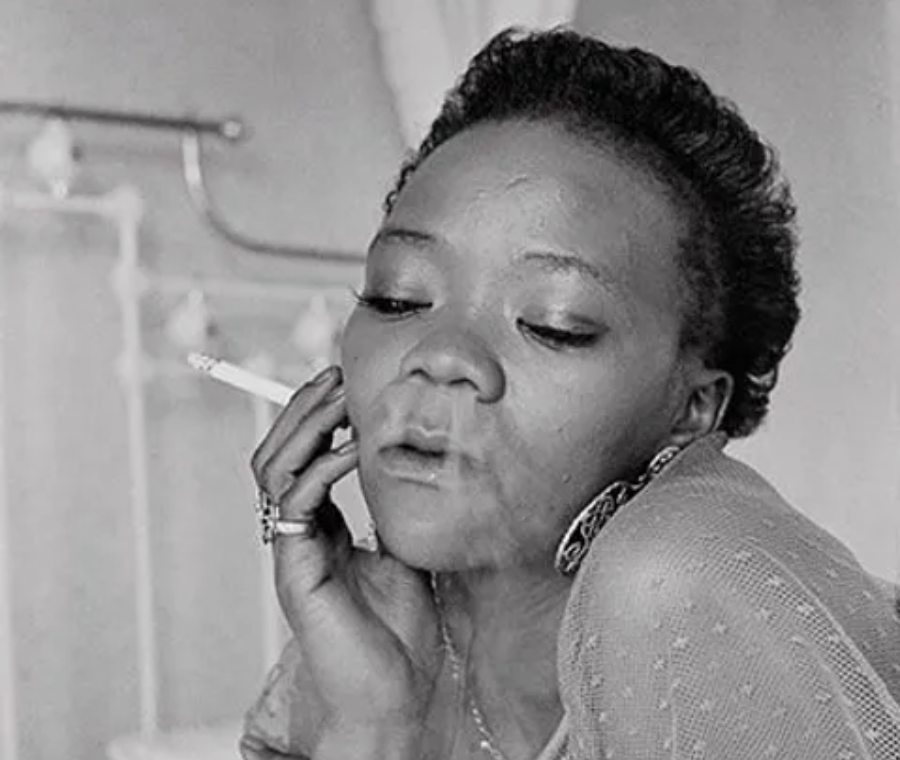Brenda Fassie was the first woman I knew who owned her sexuality.
Her gyrating hips and itty-bitty beaded skirts often got her branded with unsavory names in the media but nothing could stop her blaze.
“WH*RE!”
“IST*B*NE!”
She hardly seemed to hear them let alone change anything. She was a born firebrand. In the Johannesburg of the late 1990s, her spirit came to symbolize a new Jezebel – the Johannesburg Woman. The Johannesburg Woman was brazen, lascivious, indulgent. She flirted with everyone as the star of the playground of a newly reconstituted South Africa. She didn’t wait to receive anything, she preferred to get up and take the bull by the horns. She evaded fear, political and personal, and in the process became a symbol of relief of that time.
For people who didn’t grow up in that time in South Africa, it is hard to describe the euphoria that surrounded the late 1990s and early 2000s. Avoiding civil war, as it turns out, creates a national mood that is encompassing, arousing, titillating. With a constitution drafted with feminist input and bodily autonomy secured, anything felt possible. That atmosphere is why a Brenda Fassie poster adorned my teenage bedroom wall while I clumsily navigated my blooming girlhood.
At an unoriginally-pink teenage party, I took my first unsteady steps. I invited my classmates over to my Spice Girls theme party where I wore my denim-on-denim skirt and waistcoat two piece set. Just before the guests arrived, I excitedly bent down to tie the straps of my silver flatforms in an unimpressive children’s size 13. As Brenda’s Ngiyakusaba began to boom through the speakers, I wanted to dance with every boy there. Before I knew it, nearly each dance ended with a cheeky kiss. And though I had set up these perfect conditions for my romantic debut, I found myself frustratingly disappointed. Despite giving everyone my best attempt at channeling Brenda’s carefree spirit, the horizons of her freedom eluded my clumsy replication. I kissed one boy, two boys, four boys, one hundred and four boys perhaps. Each unmemorable set of lips was only recognisable for the hollowness and tacit fear each approach would elicit in me. I didn’t express my disappointment to them. I wanted everyone else to have a good time, after all.
It was only after everyone left, as I lay on my bed alone, I realised that I had left my own party poorer than expected. I mulled on my Brenda Fassie poster through teary eyes. I had played Brenda to the best of my ability and found myself wanting. The anguish and regret was nearly overwhelming for my teenage self.
It took years for me to let Brenda go and ask if it was what I wanted.
A decade and a half later, and with some experience under the belt, I was faced with the fact that sex didn’t feel like a freedom that was worth its weight. I wanted to know why. Several experiences of confusion, pressure, unclear expectations, and fear did not add up. Instead of a passionate, rhythmic, symbiotic tango, I was offered a cultural script of sexual performance not sexual connection. The script dictated the tepid touch of a “lover” in such narrow ways that they barely noticed my dissociation throughout our time together. Real intimacy was left at the door, sacrificed because safety could never be guaranteed. It was why nobody even noticed when I took a sharp, fearful breath every time a man touched my body. Each night spent together intertwined seamlessly with the low hum of female fear of male violence that permeated the culture around us, imprinting itself in our minds unwelcomed. There, laid bare, was our price to pay for living in the rape capital of the world.
A lifetime of experiences in the South African female fear factory had warped my view of my own sexuality. The scars of it felt omnipresent. I struggled to reconcile the image of Brenda Fassie’s freedom against the scourge of sexual harassment, binge-drinking culture, and patriarchy in her beloved South Africa. Identifying the external effects was easier than looking inward. It took years for me to do that. When I was scared that my body would be rendered a weapon against me, how could I find the courage to be uninhibited? And if fear was the silent partner that every South African woman slept beside, where was it safe to truly lay your head down and rest?
Up on her stadium stages, I realized that the magic of Brenda Fassie was in her near-total unattainability. It was the firm boundary of the stage that allowed her to freely express herself and her sexuality without the shame and fear that patriarchy would still try to spit back at her off the stage. And even then, the patriarchy took its vengeance through her own experiences with intimate partner violence.
These days, I trace my lessons in my own sexual life back to the persona that Brenda Fassie invented. I channel it to allow myself to bring the walls down and connect with my partners, rather than accept fear as the price paid by women who insist on using their sexual agency. I have dance parties to Weekend Special and relearn her lessons in 45-minutes of unbridled, unrestricted sexual freedom for me, by me. I drink in Brenda’s raspy voice and consider myself lucky to have learned and relearned my own agency at the feet of her example of freedom. I know that she would not want me to have to dissociate, fear, or shut down at the barrel of patriarchy’s gun. She knew that I would need her example to guide me towards something better.
She would want me to be where I am now; where this body is finally my body and I inhabit it fully.
Here, I’m no weekend special.
—————————————————————-
Note: iStabane/iSt*b*ne is a South African derogatory term for a lesbian.







